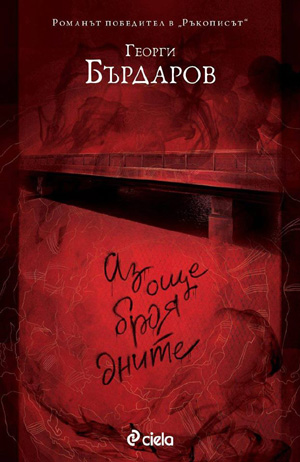May 18, 1993, Sarajevo. A man and a woman fall down under bullets on the Vrbanja Bridge over the Miljacka River. He dies on the spot and she gathers just enough strength to crawl to his body and embrace him...
The story of the tragic love of a Christian man and a Muslim woman from the besieged city of Sarajevo captures the imagination. Georgi Bardarov knows that the best stories come from life itself. Therefore, he decided to go to Bosnia in order to hear the story of the lovers from the people who knew them, but also to feel the wounds in the souls of survivors of the brutal civil war. Thus a novel entitled "I am Still Counting the Days," was born. Its premiere will take place at the end of May.
 “When I listened to the stories of people, I realized the nightmare they experienced - this was the cruellest blockade of a city in human history that lasted for over 3 years,” the writer says. “Then I decided to go to the Vrbanja Bridge over the Miljacka. The characters in my book tried to cross the bridge in order to escape from Sarajevo. I wanted to symbolically write the final of the novel there. But as soon as I set foot on the bridge, I collapsed and cried because I felt all the pain of people. Not accidentally, one of the main storylines in my novel is related to the roots of hatred in the Balkans - we are all so similar in terms of culture, history, suffering, emotions and we still hate each other so much."
“When I listened to the stories of people, I realized the nightmare they experienced - this was the cruellest blockade of a city in human history that lasted for over 3 years,” the writer says. “Then I decided to go to the Vrbanja Bridge over the Miljacka. The characters in my book tried to cross the bridge in order to escape from Sarajevo. I wanted to symbolically write the final of the novel there. But as soon as I set foot on the bridge, I collapsed and cried because I felt all the pain of people. Not accidentally, one of the main storylines in my novel is related to the roots of hatred in the Balkans - we are all so similar in terms of culture, history, suffering, emotions and we still hate each other so much."
Ethnic and religious issues in Georgi Bardarov’s novel are also the sphere of his work, as he is a lecturer at the University of Sofia and feels that there is no greater folly than conflict on religious grounds. "I want to expose this absurdity, so I wrote a novel," the author says but adds he has not managed to find the source of hatred yet.
“Maybe it's the place itself – a crossroads of different worlds: East and West, Europe and Asia, Christianity and Islam, European values and the Orient. All resulted in an incredible mixture of ethnic groups, people and religions. Going back in history, it turns out that each ethnic group has some reasons to seek revenge against another one. Another reason may be the fact that people here are very emotional and hatred can be easily sparked.”
In order to protect his students from the mistakes part of the Balkan history, Georgi Bardarov teaches them to accept changes in the world without panic.
“Yes, the huge migration wave to Europe, as well as the ethnic, religious and racial changes in the population are facts. But this has happened many times in history and the world is on the way to becoming more global and cosmopolitan. Population mixing is inevitable keeping in mind the current technologies and means of communication and transportation. Another important thing is tolerance, which in Bulgaria and Europe as a whole has become something of a dirty word. Accepting people the way they are as long as they keep to the law is a valuable quality.”
In this sense, the scandalous phenomenon of vigilante migrant hunters on the Bulgarian border shows our attitude towards others, as well as the lack of statehood, the writer says.
“My novel also tells how the greatest atrocities and killings in Bosnia were committed not by the official army but by paramilitary organizations. This shows that if there was no state that cared about the welfare of people, this could lead to dangerous consequences. Extreme nationalism is a retrograde phenomenon and we cannot return to the countries of nations that existed in the past. We are to look for new identities and I am amazed how people think nations can be eternal. Today’s Rome has nothing to do with the Rome of the Caesars and senators. Extreme nationalism is dangerous and could lead to conflicts, war and blood, as during the breakup of Yugoslavia.”
English: Alexander Markov
At a special ceremony at the Romanian Embassy in Sofia, Ambassador Brândușa Ioana Predescu presented Bulgarian conductor Nayden Todorov with the Order of Cultural Merit with the rank of Grand Officer. "We are here to honor today your Maestro whom I..
Spanish writer Ana Andreu Baquero is coming to Bulgaria to present her novel "The Princess of Buchenwald" , the Cervantes Institute, which is organising the event with the Hermes publishing house, announced. The presentation of the book is scheduled..
On February 12, in the cosy space of the Bulgaria Gallery in the heart of Rome, compatriots and Italians will gather to commemorate a Bulgarian healer who with perseverance and dedication managed to change the lives of thousands of..

+359 2 9336 661
